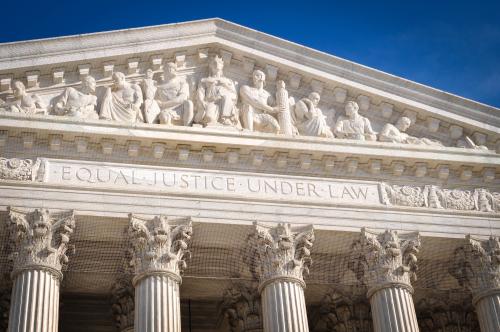The fate of the Affordable Care Act (ACA) hung in the balance in King v. Burwell, making it one of the Supreme Court’s most eagerly anticipated decisions ever. But the case is also about an even more important question: how our constitutional system of separated powers copes with a dysfunctional Congress.
The immediate policy implications of the 6-3 decision, penned by Chief Justice John Roberts, are clear enough: insurance subsidies under the Affordable Care Act will remain available to purchasers whose states have declined to run their own exchanges and therefore have federally run exchanges. This is a huge win for the Obama administration, which gets to continue full speed ahead with federal exchanges treated as substantially equivalent to state exchanges.
Less appreciated is what King v. Burwell tells us about future relations between the three branches. The case is just the latest in a long line of recent cases that tries to figure out how policymaking is to proceed in the contemporary age of statutes. The bottom line is that sloppy or intentionally open-ended legislation generally empowers the executive branch to figure out what a law will mean, but for especially prominent issues the Supreme Court may become the effective decider. When it decides, it is likely to go beyond the legal question immediately at hand to consider, often implicitly, questions of institutional competence. Where the justices think Congress is currently incapable of fixing problems, they may do what they can with their limited powers to play handyman.
In King v. Burwell, the Court was called in to resolve a conflict about the controversial ACA: there was a disconnect between what Congress seems to have wanted the ACA statutory scheme to accomplish and what some of the plain language clearly said. To oversimplify a bit, if “an Exchange established by the State” was straightforwardly read to refer to just those healthcare exchanges established by states, then there would be no federal subsidies available to any insurance purchasers in states that chose not to establish their own exchanges. In his caustic dissent, Justice Antonin Scalia insists that the plainness of the language makes this an easy case: “Words no longer have meaning if an Exchange that is not established by a State is ‘established by the State.’” Nothing about the broader context in which the law was drafted or passed could be relevant to understanding language so apparently clear.
But Chief Justice Roberts and the majority resisted this conclusion, insisting that the text in isolation was misleading in this case. When the entirety of the ACA was considered, Roberts concluded that it was impossible to conclude Congress would have made such an important decision about the scope of subsidies in a “winding path of connect-the-dots provisions.” Read in light of the whole statute and what it was manifestly intended to achieve, “established by the state” thus took on substantial ambiguity that it was properly the Court’s job to resolve.
In deciding, as the leaders of the legislative coalition that passed the ACA in 2010 hoped they would, Roberts justifies the Court’s approach with a peroration praising Congress: “In every case we must respect the role of the Legislature, and take care not to undo what it has done. A fair reading of legislation demands a fair understanding of the legislative plan.” Elsewhere in the opinion, Roberts makes it clear that he sees the Court as having effectively reinforced a Congress that had a clear purpose but whose “inartful drafting” threatened its ability to secure its desired outcome. He chides Congress for its imprecision, noting that “the Act does not reflect the type of care and deliberation that one might expect of such significant legislation,” but nevertheless comes to its aid.
For Justice Scalia and the other two dissenters (Justices Thomas and Alito), this kind of thinking reflects blameworthy judicial arrogance. As they see it, the Court has given itself the license to usurp Congress’s exclusive lawmaking authority—and it is no justification at all that the Court confidently portrays itself as giving force to what Congress really wanted, just a symptom of the underlying hubris. The dissenters note that Congress has many purposes, some of which might very plausibly have been served by incentivizing states to create their own healthcare exchanges, and that looking to the statute as a whole does nothing to decisively establish that the “established by the State” language was some kind of flub. Rather, “If there was a mistake here, context suggests it was a substantive mistake in designing this part of the law, not a technical mistake in transcribing it,” and the Court is left with “no authority to dismiss the terms of the law as a drafting fumble.”
This is the crux of the two sides’ disagreement: the majority conceptualizes itself as giving a helping hand to a congressional coalition that regrettably executed its will with less than perfect clarity, and sees this willingness to help see its “legislative plan” through to fruition as a fittingly modest role for the judiciary. The dissent, on the other hand, conceptualizes “Congress” as a more coherent and potent institution that does not need judicial assistance. If the law contained contradictions, the membership at the time contained multitudes—including specially elected Senator Scott Brown (R-MA), whose presence made it impossible for Democrats to conduct a more thorough editing process of the law—and it is for Congress itself to work those contradictions out by amending the law.
But how likely is that? Ah, Justice Scalia says, even asking that question is out of line for the Court, which is not supposed to judge anything about the quality of original deliberation or the likelihood of the current Congress’s response. For Scalia, “It is up to Congress to design its laws with care, and it is up to the people to hold them to account if they fail to carry out that responsibility.” When the Court acts in Congress’s stead it “both aggrandizes judicial power and encourages congressional lassitude.”
Scalia has the textbook constitutional model of government on his side, but in the present moment many would assert that Congress is so far from the capable, iterative legislature that the textbook model cannot possibly be applied in good faith. There is a partisan version of this, which doubts that a Republican Congress should be treated as a legitimate source of government decision-making. When Justice Scalia says Congress would have to act to decide what will become of a no-federal-exchange-subsidies ACA, many see him in cahoots with a minority Tea Party faction hell-bent on laying ruin to the law, making a farce of the idea of constructive revision.
But there is also an institutionalist version—which is how I imagine the Chief Justice and Justice Kennedy approaching this case. (I have elsewhere argued how this thinking may have guided Justice Kennedy’s thinking in another hugely important statutory interpretation case.) Basically, justices are sensitive on a case-by-case basis to whether Congress actually is a reliable law-giver. If Congress has showed evidence of lively attention to an important issue, the old textbook model (“let Congress fix its own mistakes, if that’s what they are”) will win out; if Congress has demonstrated lassitude in the policy area, the Court will be more willing to engineer what it takes to be a workable approach to a policy area.
When it comes to legislating around the ACA, we only have five years of experience but the record is quite clear: actually passing ACA legislation into law is not something that Congress does. From 2011 through 2014 that was thanks to a split between a Republican House and Democratic Senate; in 2015 and beyond it is because “Congress” in the sense of the legislative body capable of enacting laws includes the President-as-veto-player. The majority could be forgiven for thinking that Congress as ACA self-correcter seems like a chimera in this political context.
And yet Justice Scalia’s warning of judiciary-promoted congressional “lassitude” should truly worry us. In his thoroughly dyspeptic opinion (which ends, “I dissent,” rather than the customary “I respectfully dissent”), Justice Scalia damns the Court’s majority for its willingness to treat the ACA differently from all other laws—going so far as to suggest we should call the law “SCOTUScare.”
But the deeper part of his criticism goes well beyond healthcare law, to the question of whether our constitutional separation of powers can soldier on with only spasmodic contributions from its first branch, or whether we must insist that Congress (and both parties therein) more dependably deliver something resembling coherent and workable policy. “Lassitude” conjures up a very different mental image from gridlock, but that shouldn’t make us miss Justice Scalia’s point: King v. Burwell means Congress doesn’t have to work it out, among themselves or with the Obama administration. We can now expect at least another eighteen months of fruitless repeal votes and posturing coupled with legally problematic, executive-engineered kludges. Champions of the ACA are happy with this scenario, given currently available alternatives, but unfortunately it makes it much harder to envision the path back to a functional policymaking system with Congress at the helm.



Commentary
King v. Burwell, congressional dysfunction, and the contemporary separation of powers
June 25, 2015